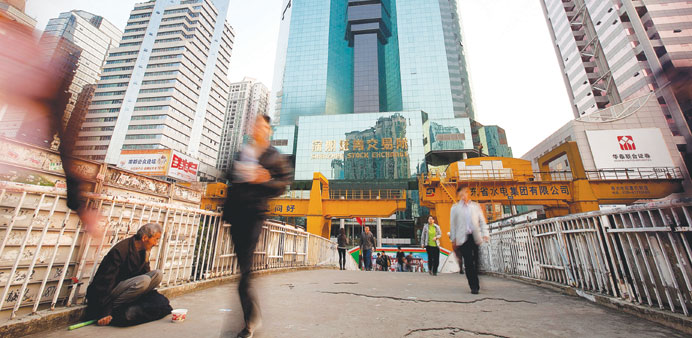Shenzhen Stock Exchange building in China. With at least $364bn of borrowed money riding on stocks in Shanghai and Shenzhen, losses on those positions threaten to magnify market declines as traders sell shares to meet margin calls.
Bloomberg/Hong Kong
The biggest tumble in Chinese shares since 2008 is proving especially painful for margin traders as their favourite stocks sink faster than the benchmark index, raising the risk of forced liquidations.
The 30 equities in Shanghai with the highest levels of margin debt relative to tradable shares have dropped 17% on average since the market peaked on June 12, versus a 13% decline for the Shanghai Composite Index. Margin positions on the city’s bourse fell for the first time in a month on Friday, a sign that leveraged investors are unwinding bets after they grew more than five-fold in the past year.
With at least $364bn of borrowed money riding on stocks in Shanghai and Shenzhen, losses on those positions threaten to magnify market declines as traders sell shares to meet margin calls. China’s benchmark index tumbled at the fastest pace among global equity gauges last week, after a world-beating 152% gain in the previous 12 months.
“It’s a self-fulfilling prophecy,” Roshan Padamadan, the founder and manager of Luminance Global Fund, said in an interview on Bloomberg Television from Singapore. “As people try to book profits, they’ll find out that there’s nobody on the other side of the trade.”
The Shanghai Composite gained 2.2% at the close on Tuesday, rebounding from an intraday drop of as much as 4.8%.
EGing Photovoltaic Technology Co, a Chinese solar- equipment maker in eastern Jiangsu province, dropped 21% from June 12 through last week after outstanding margin bets climbed to 44% of the company’s free-float adjusted market capitalisation, the highest level among more than 480 equities tracked by Bloomberg and the Shanghai Stock Exchange.
Shanghai Construction Group Co, with a margin trade ratio of about 34%, has retreated 19%, paring gains over the past year to 243%. Shenzhen-based Joincare Pharmaceutical Group Industry Co declined 20% after margin bets reached almost 27% of free float.
In a margin trade, investors use their own money for just a portion of the stock purchase, borrowing the rest from a brokerage. The loans are backed by the investors’ equity holdings, meaning they may be compelled to sell to repay their debt when prices fall.
“You can see from Friday’s sharp decline that people are already cutting losses on margin trading,” said Mari Oshidari, a Hong Kong-based strategist at Okasan Securities Group. “This is still ongoing, so we should watch out for further selling pressure.”
While margin debt has surged in recent months, it’s still at manageable levels relative to the size of China’s $8.8tn stock market, according to Aaron Boesky, the chief executive officer at Marco Polo Pure Asset Management, which runs a China-focused hedge fund.
Investors should take advantage of market declines to increase holdings, Boesky said, anticipating the Shanghai Composite may rally another 36% to surpass its all-time high in October 2007.
“It is best to buy the dips,” he said in an e-mail on June 21. “Consolidation allows for those already high returns to sell and take profit, and those who have resisted jumping into the market to now have an appetising entry point.”
Margin traders have been such an important source of demand for Chinese shares that any pullback, particularly one caused by regulatory efforts to curb the use of leverage, will weigh on the market, according to Ronald Wan, the chief executive officer of Partners Capital International in Hong Kong.
Almost all of this year’s biggest declines in the Shanghai Composite, including a 6.5% slump on May 28, were sparked by investor concerns over margin-trading restrictions.
The China Securities Regulatory Commission is planning to curb the amount of margin trades and short sales financed by brokerages to no more than four times their net capital, according to draft rules posted on its website June 12. Brokerages including GF Securities Co and Haitong Securities Co have already tightened lending requirements to limit their exposure to any market downturn.

